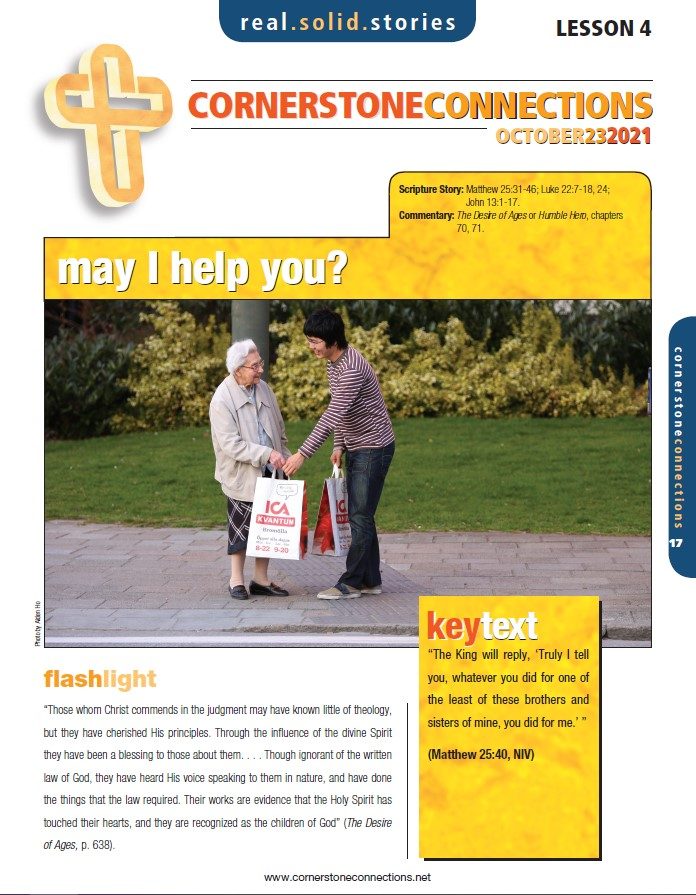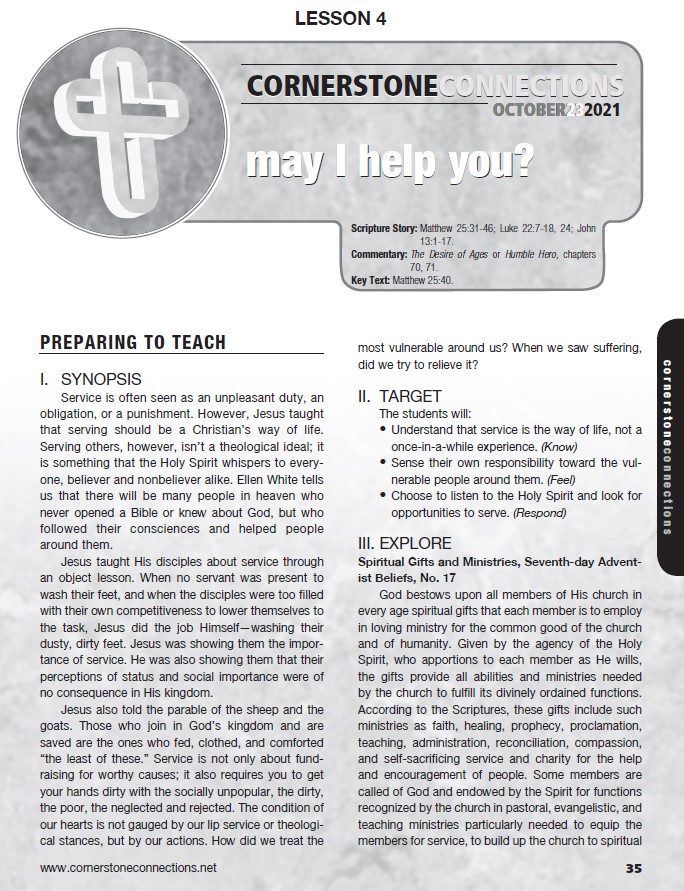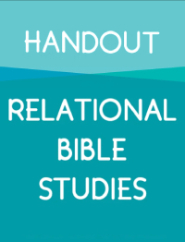Click below to download the Cornerstone Connections leader’s guide and student lesson. This week’s resources also include two lesson plans and a discussion starter video which offer different ways of looking at the topic. Each lesson plan includes opening activities, scripture passages, discussion questions, and real-life applications.
When no servant was present to wash the disciples’ feet, Jesus did the job Himself. Service requires us to get our hands dirty for “the least of these.”
Scripture Passages
Matthew 25:31-46
Micah 6:8
Isaiah 61:1
OVERVIEW
How often do you look the other way when you see someone with a sign asking for money or food? On every side most of us are confronted with the ugly reality that not everyone has the proper amount of food to eat or a nice comfy, safe place to sleep. Is it possible that our response to those that have less than we do may be an indication of how our relationship with Jesus stands? This is a difficult question and one that will be explored in today’s lesson.

OPENING ACTIVITY
If you are able, provide one of each of the following for each member of your Sabbath School. This list may vary some depending on where you live, but the following is a list of things that are usually appreciated in a comfort kit. (If you are unable to provide several items per student, provide at least one item per student and have them assemble the kit together.)
Instructions:
Have each student assemble a comfort kit. As they create the kit, ask them to pray that God will help the recipient understand that the kit was put together with love and that they are not alone. Help them to understand that they are being God’s hands and feet.
QUESTIONS
TRANSITION
One day a group of young adults were in the park. After a little while they sat down at a table to eat their lunch. Not long after they sat down a woman walked up to them. It became evident quickly that something was wrong because her words were unintelligible, her hair was wild, her jacket was stained, and her pants were wet with urine, feces, and period stains. The young adults were faced with a decision. Should they invite her to sit down and share their lunch or tell her to go away? What would you do?

BIBLE STUDY GUIDE
Read Matthew 25:31-46.
31 “When the Son of Man comes in his glory, and all the angels with him, then he will sit on his glorious throne. 32 Before him will be gathered all the nations, and he will separate people one from another as a shepherd separates the sheep from the goats. 33 And he will place the sheep on his right, but the goats on the left. 34 Then the King will say to those on his right, ‘Come, you who are blessed by my Father, inherit the kingdom prepared for you from the foundation of the world. 35 For I was hungry and you gave me food, I was thirsty and you gave me drink, I was a stranger and you welcomed me, 36 I was naked and you clothed me, I was sick and you visited me, I was in prison and you came to me.’ 37 Then the righteous will answer him, saying, ‘Lord, when did we see you hungry and feed you, or thirsty and give you drink? 38 And when did we see you a stranger and welcome you, or naked and clothe you? 39 And when did we see you sick or in prison and visit you?’ 40 And the King will answer them, ‘Truly, I say to you, as you did it to one of the least of these my brothers, you did it to me.’
41 “Then he will say to those on his left, ‘Depart from me, you cursed, into the eternal fire prepared for the devil and his angels. 42 For I was hungry and you gave me no food, I was thirsty and you gave me no drink, 43 I was a stranger and you did not welcome me, naked and you did not clothe me, sick and in prison and you did not visit me.’ 44 Then they also will answer, saying, ‘Lord, when did we see you hungry or thirsty or a stranger or naked or sick or in prison, and did not minister to you?’ 45 Then he will answer them, saying, ‘Truly, I say to you, as you did not do it to one of the least of these, you did not do it to me.’ 46 And these will go away into eternal punishment, but the righteous into eternal life.”
QUESTIONS
Read Micah 6:8.
8 He has told you, O man, what is good; and what does the Lord require of you but to do justice and to love kindness, and to walk humbly with your God?
QUESTIONS
Discuss the above questions again once you have watched the following Bible Project video: https://bibleproject.com/explore/video/justice/
Read Isaiah 61:1.
The Spirit of the Lord God is upon me,
because the Lord has anointed me
to bring good news to the poor;
he has sent me to bind up the brokenhearted,
to proclaim liberty to the captives,
and the opening of the prison to those who are bound;
QUESTIONS

APPLICATION
The group of young adults quickly made room at the picnic table, divided their food, provided hand sanitizer, and politely looked the other way while she gobbled up the food they provided. When she had eaten all she wanted, they gave her some clean clothes. The woman got up without a thank-you or any kind words and wandered off into the park.
QUESTIONS
Some might say they didn’t really help the woman in the long term, but what about how it made them feel? Could it be that God was allowing this woman to enter their lives so that they would be forced to make a choice whether or not to follow His teachings? Maybe this was just the first step in helping the woman to get additional help. Sometimes situations like this are God’s way of making His teachings come to life.
FOLLOW UP
Find someone to give your comfort kit to. Until the next Sabbath when you return to your youth group, pray for the person to whom you gave your kit. Report to your group how your interaction went and how praying for this person has impacted your life.

SCRIPTURE PASSAGE
Matthew 25:31-46
LEADER’S NOTE
For a Relational Bible Study (RBS) you’ll want to get into the Scripture passage and encourage the youth to imagine participating in the story while it’s happening. Then you will be able to better apply it to your own situation today.
You will need to ask God for the Holy Spirit to be present as your small group discusses the questions (no more than 3-6 people in a group is recommended). Start with the opening question. It is a personal question and the answer is unique for each individual. There is no right answer and nobody is an expert here, so don’t be surprised when you hear different responses. You are depending on the Holy Spirit to be present and to speak through your group. Say what God prompts you to say, and listen to what others share.
Take turns reading the chapter out loud. Follow that with giving the students some time to individually mark their responses to the questions (a PDF version of the handout is available as a download). This gives each person a starting point for responding when you start to share as a group. Next, begin the discussion by asking the students to share what they marked and why on each question as you work your way through. Feel free to take more time on some questions than others as discussion warrants.
Encourage each person in the group to apply what is discussed to their personal lives and to share with the group what they believe God wants them to do. Then ask them to pray that God will help each of them to follow through in doing so. Remind them to expect that God will show them ways to live out the message of this passage in the coming week, and that they are free to ask others in the group to help hold them accountable.
OVERVIEW
This is one of the most vivid parables Jesus ever spoke, and the lesson is crystal clear—that God will judge us according to our reaction to human need. His judgment does not depend on the knowledge we have amassed, or the fame that we have acquired, or the fortune that we have gained, but on the help that we have given. And there are certain things which this parable teaches us about the help which we must give.
The things which Jesus picks out—giving a hungry man a meal, or a thirsty man a drink, welcoming a stranger, cheering the sick, visiting the prisoner—are things which anyone can do. It is not a question of giving away thousands of dollars, or of writing our names in the annals of history; it is a case of giving simple help to the people we meet every day. There never was a parable which so opened the way to glory to the simplest people.
Those who helped did not think that they were helping Christ and thus piling up eternal merit; they helped because they could not stop themselves. It was the natural, instinctive, quite uncalculating reaction of the loving heart. Whereas, on the other hand, the attitude of those who failed to help was, “If we had known it was you, we would gladly have helped; but we thought it was only some common man who was not worth helping.” It is still true that there are those who will help if they are given praise and thanks and publicity; but to help like that is not to help, it is to pander to self-esteem. Such help is not generosity; it is disguised selfishness. The help which wins the approval of God is that which is given for nothing but the sake of helping.
Jesus confronts us with the wonderful truth that all such help given is given to Himself, and all such help withheld is withheld from Himself. When we learn the generosity which without calculation helps people in the simplest things, we too will know the joy of helping Jesus Christ Himself.
The judgment identifies sins of omission as most serious. All one needs to do to miss out on God’s grace is to ignore Him. The judgment identifies Christ with the needy, so that a deed of love to “one of the least of these, My brethren” is a deed of love for Christ (v. 40). And in verse 45 the failure of the unrighteous to serve “one of the least of these” was a failure in relation to Christ.
“The Least of These”
Share about a time you have been able to do something for someone who has fewer tangible blessings than you have.
Read Matthew 25:31-46.
31 “When the Son of Man comes in his glory, and all the angels with him, he will sit on his glorious throne. 32 All the nations will be gathered before him, and he will separate the people one from another as a shepherd separates the sheep from the goats. 33 He will put the sheep on his right and the goats on his left.
34 “Then the King will say to those on his right, ‘Come, you who are blessed by my Father; take your inheritance, the kingdom prepared for you since the creation of the world. 35 For I was hungry and you gave me something to eat, I was thirsty and you gave me something to drink, I was a stranger and you invited me in, 36 I needed clothes and you clothed me, I was sick and you looked after me, I was in prison and you came to visit me.’
37 “Then the righteous will answer him, ‘Lord, when did we see you hungry and feed you, or thirsty and give you something to drink? 38 When did we see you a stranger and invite you in, or needing clothes and clothe you? 39 When did we see you sick or in prison and go to visit you?’
40 “The King will reply, ‘Truly I tell you, whatever you did for one of the least of these brothers and sisters of mine, you did for me.’
41 “Then he will say to those on his left, ‘Depart from me, you who are cursed, into the eternal fire prepared for the devil and his angels. 42 For I was hungry and you gave me nothing to eat, I was thirsty and you gave me nothing to drink, 43 I was a stranger and you did not invite me in, I needed clothes and you did not clothe me, I was sick and in prison and you did not look after me.’
44 “They also will answer, ‘Lord, when did we see you hungry or thirsty or a stranger or needing clothes or sick or in prison, and did not help you?’
45 “He will reply, ‘Truly I tell you, whatever you did not do for one of the least of these, you did not do for me.’
46 “Then they will go away to eternal punishment, but the righteous to eternal life.”
1. Why did “The King” compare people to sheep and goats?
2. Why did “The King” give the kingdom to the “sheep” on the right?
3. Why are righteous surprised that “The King” gives them the kingdom?
4. What was “The King’s” response to the righteous people?
5. What did “The King” say to those who were on the left?
6. What were the charges for the “goats” on the left?
7. As you read the story, are you currently “sheep” or “goat”? Why?
8. What would “The King” say to you if He summed up your life right now?
SUMMARY
In our passage for consideration, we come across sheep and goats, a simile that helps us envision the literal judgment scene. We are to envision people being separated from one another, but it will happen in the same manner as the shepherd separates the sheep from the goats. Sheep and goats were sometimes herded together down a chute that was wide enough for only one animal at a time. A shepherd would sit atop the fence, swinging a gate back and forth to guide each animal through the appropriate opening to join its own kind.
Jesus completed the judgment scene and the discourse by summarizing the eternal destinies of the two categories of people. The unrighteous would go away (a permanent departure) into eternal punishment, but the righteous would enter eternal life. The use of “eternal” to modify both “punishment” and “life” contrasts the two destinies and emphasizes their permanence. By the time each person stands before The King, his or her eternity is established and cannot be changed.

APPLICATION
The hour of our Lord’s second coming is very uncertain, which is a good reason why we should live not only in a state of habitual preparation but actual diligence in present service for Him and engaged in works of charity for humanity. Those who have so lived will in that day receive the grandest degree in the universe, the “well-done” of Jesus Christ.
Below, find some application activities to reinforce this lesson. These are simply to provide ideas for your usage, or to invite you to imagine and create some of your own, as you impact the lives of teens for God’s glory.





